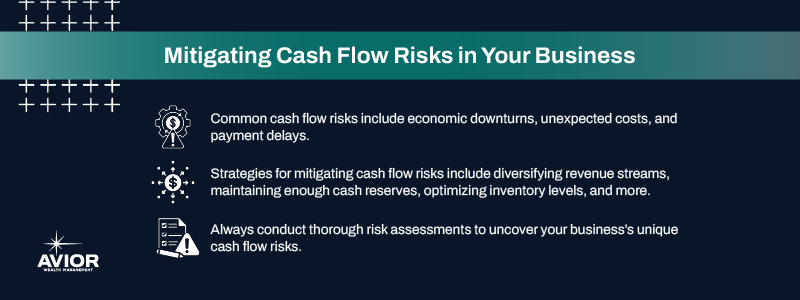Mitigating Cash Flow Risks in Your Business
Learn how to identify cash flow risks and what your business can do to proactively prepare for the worst.

Cash flow issues continue to plague the small businesses of America. No matter how solid your business plan may be, even the slightest inconvenience can quickly derail your growth trajectory and create expensive problems.
The key to preventing these expensive (and often unnecessary) headaches is to solidify your cash flow management strategy in such a way that it helps your organization steer clear of common risks. Effective risk mitigation strategies are essential for protecting business cash flow and ensuring long-term financial stability.
Understanding Cash Flow Risks
The first step in managing cash flow risk is to know precisely what to expect in the first place. From there, you can develop proactive contingency plans that you can deploy.
Some of the biggest risks to business cash flow include:
- Economic downturns: Some market swings can’t be predicted, and unfortunately, economic factors play a big role in business success. For example, inflation, unemployment rates, interest rates, and tax laws can all impact a business.
- Customer payment delays: Another hangup is waiting on customers to pay. This can disrupt cash flow, making it challenging to cover necessary business costs.
- Unexpected expenses: Certain operational costs may spike out of nowhere. What’s your plan if your business’s building suffers extreme damage or an expensive piece of equipment needs to be replaced?
- Insufficient reserves: Not having enough cash in reserve to cover unexpected costs can snowball cash flow issues, damage margins, and further restrict what your business can put away for a rainy day.
- Inaccurate forecasting: Proper forecasting is a must, using historical data from the business and robust market predictions to make better calculations and decisions.
These risks, when left to nothing but chance, can quickly impact business operations, profitability, and growth.
How to Mitigate Cash Flow Risks
Fortunately, there are strategies you can implement now that will protect your business against these serious cash flow risks.
1. Diversify Your Revenue Streams
First, consider ways to generate revenue from multiple sources. This will help you reduce your reliance on a single product, service, or customer base.
Explore new markets and segments you can reach, explore new partnerships, and experiment with new target audiences.
2. Improve Credit Management
If your business extends credit to customers, reevaluate your credit policies and procedures.
Take steps like conducting thorough credit checks and closely monitoring payment history to ensure you won’t be in a tough situation with a customer in the future.
Establish specific criteria that your business must follow when considering a new customer.
3. Maintain Adequate Reserves
Similar to your personal finances, your business needs emergency funds to cover unexpected expenses and cash flow shortages.
Make sure you have enough to cover whatever comes your way by creating a reserve fund policy with regular monitoring and contributions.
Consider how much you need to have saved to cover a sudden equipment replacement, for example, or how many months’ worth of expenses you want saved in case the worst happens.
4. Improve Forecasting and Budgeting
Accuracy is important in cash flow management. While you can’t fully predict the future, you can establish more accurate cash flow projections by analyzing business data and customer behavior.
Create detailed budgets and track business expenses closely each month. Forecasts should be living documents that you review and adjust regularly.
These insights will help you continue improving your forecasting methods.
5. Manage Inventory Effectively
If you deal with a lot of inventory, it’s important to optimize inventory levels to avoid excess product and stockouts.
Certain supply chain issues can be hard to predict, such as what the supply chain world experienced when the COVID-19 pandemic hit, but being proactive and keeping a continuous eye on stock levels can help.
Create efficient inventory management systems that continuously monitor inventory and help your business reduce waste using digital tools and data analysis.
6. Negotiate More Favorable Terms
Look through your contracts with suppliers and vendors to see if there’s room to negotiate better payment terms or pricing.
Ask about early payment discounts or specials that can help your business save money.
Whatever you do, avoid late payment penalties at all costs.
7. Consider Insurance Coverage
Business insurance can be a lifesaver, helping to protect against significant losses from unforeseen circumstances, such as when a natural disaster strikes or when a customer files a claim against you.
For example, liability insurance protects you against lawsuits filed by outside parties, and commercial property insurance protects against damage to your physical assets.
Business income or interruption insurance applies when you can’t operate your business for a time.
8. Conduct a Cash Flow Risk Assessment
Finally, be sure you assess your cash flow risks, as every business has different threats and challenges.
Look closely at your income sources and expenses to identify risks and what those risks would do to the bottom line. Some risks will be more detrimental than others. Conduct a formal risk assessment, bringing in other departments as needed, to start prioritizing risk mitigation efforts and putting resources where they’re needed most.
Let Avior Help Your Business Keep Its Cash Flow on Track
Cash flow risks for businesses are serious and stand to significantly impact growth and success. Implementing these strategies will help you stay proactive and make better decisions when disaster strikes.
Working with a financial expert can be the key your business needs for optimal cash flow management. The team at Avior can help you review your finances and put the right practices in place for better cash flow and long-term growth.
Schedule a one-on-one consultation with Avior today to get started.
Disclaimer: Nothing contained herein should be construed as legal or tax advice. Avior and our Advisors will work with your attorney and/or tax professional to assist with your legal and tax strategies. Please consult your attorney or tax professional with specific legal and/or tax questions. Investment Management and Financial Planner are offered through Avior Wealth Management, LLC, an SEC-registered investment.
No Comments
Sorry, the comment form is closed at this time.




